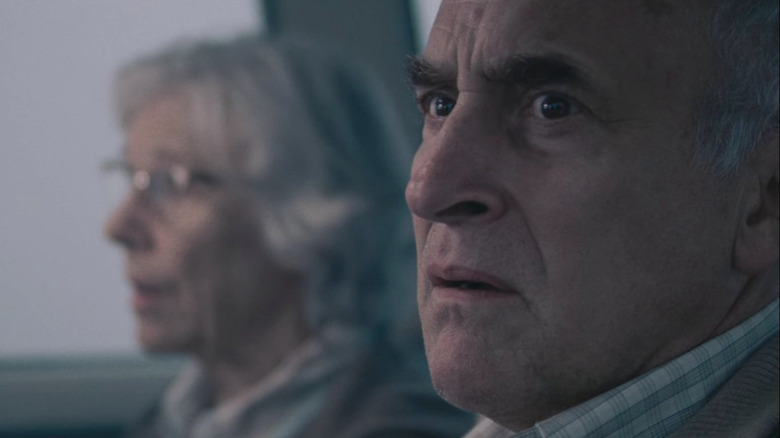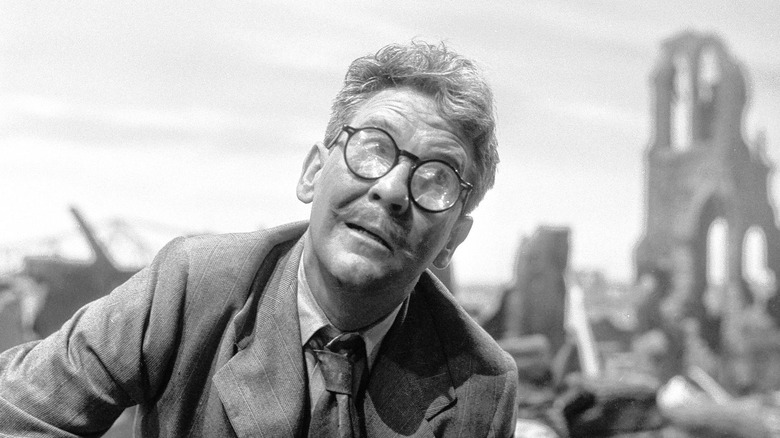Frank Darabont Wanted The Mist's Ending To Evoke A Twilight Zone Classic
Sometimes, the more disturbing and bleak the end of a film is, the more it stays with you. We all like a happy ending, but those are often a dime a dozen. Other times, an ending, however dark, can be very by-the-numbers, like when you get to the end of a horror film and — what a twist! — the murderer is still alive. When it comes to Frank Darabont's adaptation of the Stephen King story "The Mist," however, there's no denying what an enormous wallop the final twist provides.
"The Mist" is about a group of townsfolk who find themselves trapped inside a grocery store after a portal to another world has been opened, allowing terrifying monsters to breach our reality hidden inside — you guessed it — an ominous, thick mist. The central character is David Drayton, played in the film by Thomas Jane, who tries to protect his young son throughout the runtime of the movie.
Long story short, for those who haven't seen it but don't mind spoilers for a movie that just turned 15 years old, in the film's climax he's forced to do the unthinkable: he shoots all four of his companions, including his son, in order to spare them from becoming monster food as their car runs out of gas in the middle of the mist during their attempted escape. He's out of bullets. He's on his own. And then, mere minutes later, the military approaches, burning away the mist and successfully fighting off the monsters. David realizes that he will have to live the rest of his days with the knowledge that if he'd only held out a little longer, his son would be alive.
It's a depressing ending, to say the least, and one that's far darker than the source material. But it turns out, it's also an ending that was inspired by one of the most famous episodes of TV ever produced: "The Twilight Zone" classic "Time Enough At Last."
Taking inspiration from a famously bleak twist
Maybe you've never seen "Time Enough At Last," but you've almost certainly seen it referenced somewhere since the likes of "The Simpsons" and "Family Guy" have paid homage to the episode. Starring Burgess Meredith, who you might recognize either as the Penguin in the Adam West version of "Batman" or as Mickey from the "Rocky" franchise, it tells the story of a bookworm who survives a hydrogen bomb thanks to having been trapped in a bank vault. He finds himself alone in an apocalyptic hellscape upon emerging, but there's a silver lining: at long last, he'll have time to read all of the books he wants. His eyeglasses then fall from his face, breaking, and leaving him virtually blind.
It's a terrible irony, and one that resonated with Darabont while making "The Mist." Darabont spoke to Yahoo! about his decision to deviate from King's original ending, and this classic "Twilight Zone" episode's influence on the new, far darker climax:
"When that came to me, it just felt like the kind of 'Twilight Zone' ending that really stays with you. You know, 'Time Enough at Last' where Burgess Meredith breaks his glasses — that kind of ending, where you're like 'Oh no, if he'd only waited two more minutes!' I liked the horrendous irony of it."
Of course, given he was adapting the story of one of our most beloved and prolific authors of all time, he knew he needed to get the green light from King. After all, King has previously, and famously, hated adaptations that deviated too much from his source material. As Darabont recalled:
"If Stephen King reads my script and says, 'Dude, what are you doing, are you out of your mind? You can't end my story this way,' then I would actually not have made the movie. But he read it and said, 'Oh, I love this ending. I wish I'd thought of it.' He said that, once a generation, a movie should come along that just really pisses the audience off. He pointed to the original 'Night of the Living Dead' as one of those endings that just scarred you."
Darabont succeeded in pissing off audiences. In doing so, he also crafted an ending that was depressing, divisive, but most of all, incredibly memorable.

